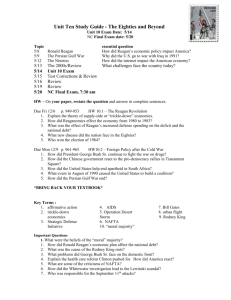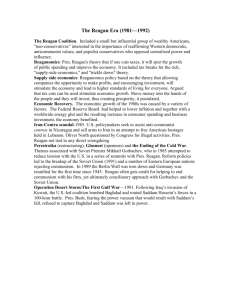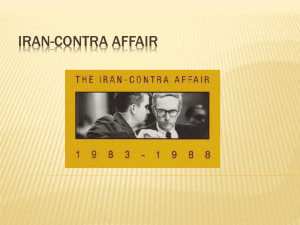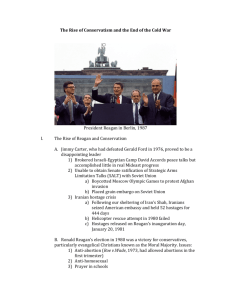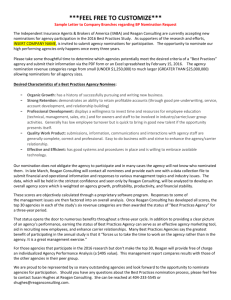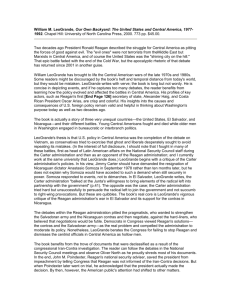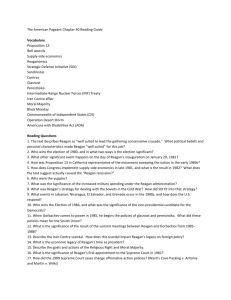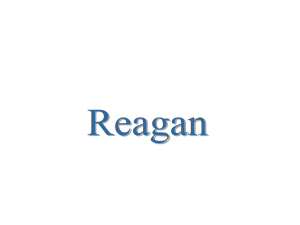Reagan's Secret Wars From This Day in History (The History
advertisement
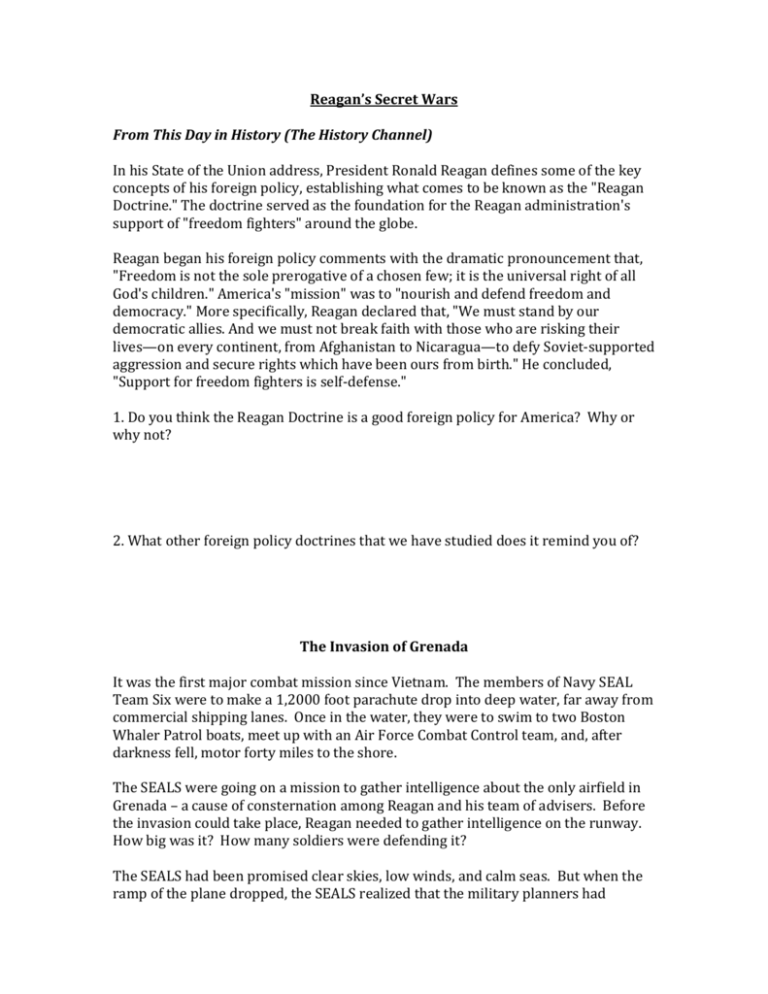
Reagan’s Secret Wars From This Day in History (The History Channel) In his State of the Union address, President Ronald Reagan defines some of the key concepts of his foreign policy, establishing what comes to be known as the "Reagan Doctrine." The doctrine served as the foundation for the Reagan administration's support of "freedom fighters" around the globe. Reagan began his foreign policy comments with the dramatic pronouncement that, "Freedom is not the sole prerogative of a chosen few; it is the universal right of all God's children." America's "mission" was to "nourish and defend freedom and democracy." More specifically, Reagan declared that, "We must stand by our democratic allies. And we must not break faith with those who are risking their lives—on every continent, from Afghanistan to Nicaragua—to defy Soviet-supported aggression and secure rights which have been ours from birth." He concluded, "Support for freedom fighters is self-defense." 1. Do you think the Reagan Doctrine is a good foreign policy for America? Why or why not? 2. What other foreign policy doctrines that we have studied does it remind you of? The Invasion of Grenada It was the first major combat mission since Vietnam. The members of Navy SEAL Team Six were to make a 1,2000 foot parachute drop into deep water, far away from commercial shipping lanes. Once in the water, they were to swim to two Boston Whaler Patrol boats, meet up with an Air Force Combat Control team, and, after darkness fell, motor forty miles to the shore. The SEALS were going on a mission to gather intelligence about the only airfield in Grenada – a cause of consternation among Reagan and his team of advisers. Before the invasion could take place, Reagan needed to gather intelligence on the runway. How big was it? How many soldiers were defending it? The SEALS had been promised clear skies, low winds, and calm seas. But when the ramp of the plane dropped, the SEALS realized that the military planners had forgotten to take into account the daylight savings time change, and a one-hour miscalculation is no small thing twelve degrees north of the Equator, where the sun drops in a hurry. “It was pitch black everywhere,” a SEAL remembered later. “We were told it was going to be a daylight drop.” As the jumpers dropped into darkness, they were overcome by wind and rain. They were surprised when they hit the ocean much sooner than expected. A few later estimated that instead of the safe jumping height of 1200 feet, they had gone out at the dangerously low height of 600 feet. The first eight SEALS hit the water so hard that their fins and equipment pouches sheared off. Swells were ten feet high and the wind on the water was so stiff that parachutes would not deflate. Many could not find the Boston Whalers, so they decided to just swim to the Air force Command boat. Out of the 16 seals that were dropped into the water that night, four were never found. They likely were pulled underwater by their parachutes. An inauspicious beginning for what would become a major foreign policy success for Reagan. What was the reason behind Operation Urgent Fury? Grenada’s Marxist-Leninists government had devolved into a military council after internal conflict left the Prime Minister and his supporters dead. A curfew had been imposed by the rattled General now in control. “Anyone violating this curfew will be shot on sight,” a proclamation read. 800 American Medical Students at St. Georges University Medical School were trapped on the island as potential hostages. The goal of the invasion was to not only ensure the safety of American citizens, but to stand up a new democratic pro-American government in Grenada. When VP George Bush questioned the legality of a regime change by force, Reagan replied: “Well, if we’ve got to go there, we might as well do everything that needs to be done.” Reagan had been beating the drum about Central America for more than two years. He wanted to overthrow the government in Nicaragua, the Sandinistas, but Congress passed a bill limiting the Department of Defense or the CIA from allocating any money to foment and assist a coup in Nicaragua. Reagan’s scare tactics included speeches like the following: “On the small island of Grenada, at the southern end of the Caribbean chain, the Cubans, with Soviet financing and backing, are in the process of building an airfield with a ten thousand foot runway. Grenada doesn’t even have an air force. Who is it intended for? The real reason for runway had to do with increasing tourism revenue. Even Great Britain had invested money in its construction. It was public knowledge. But when you’re looking to rally support for a covert war in Grenada, details are sometimes better left out. Meanwhile, Congress continued to block requests to intervene in Central America. In response to an intransigent Congress, Reagan issued a secret directive which ordered his National Security Team to draw up plans for destabilizing the economy and political institutions of Grenada, to overthrow its socialist government, and to rid the island once and for all of its Soviet and Cuban influence. That’s when the fall of the socialist regime provided Reagan with the opportunity he had been waiting for. 1. Should the United States use military force or diplomacy to retrieve the hostages? Support your answer with at least two reasons. 2. Was the president overstepping the limits of his powers by ordering the mission secretly? 3. Does the rush of international events overtake the limits on presidential power set forth by the Constitution? Was Operation Urgent Fury a success? Shortly before the incursion into Grenada, a suicide bomber drove a truck into the US Marine Barracks in Lebanon, killing 241 soldiers. According to PBS, “Reagan’s placement of the Marines as peacekeepers of a tenuous cease-fire between Christians and Muslims in Lebanon had been divisive from the start.” Americans were weary of foreign intervention well before the invasion of Grenada began. However, resistance on Grenada melted away pretty quickly. Most of the damage inflicted on the US was through friendly fire, due to a lack of coordinated information between the different branches of the military. Days earlier, when asked point blank if an invasion was pending by a reporter from NBC, Reagan’s Deputy National Security Advisor replied, “Preposterous.” Although Americans had subdued ground forces within two days, the secrecy and uncertainty surrounding events in Grenada and Lebanon caused Reagan’s popularity to drop. And then somebody took the picture… Media! Describe the image on the Smartboard. How do you think the American public will react to it? Media! What does Reagan’s speech accomplish? Do you think he deserves his nickname, “The Great Communicator?” Tip O’Neil, Speaker of the House, criticizing Reagan… “You can’t justify any government, whether it’s Russia or the United States, trampling on another nation. I’m worried about the effects of this. Where do you go from here? This is Machiavelli: If they can’t love ya, make ‘em feel ya. He is wrong in his policy. He’s caused us continuous harm… He only works three and a half hours a day. He doesn’t do his homework, He doesn’t read his briefing papers. It’s sinful that this man is President of the United States. He lacks the knowledge that he should have, on every sphere, whether it’s the domestic or whether it’s the international sphere.” 1. Do you agree or disagree with O’Neil’s statement? International Response When asked about what he thought of the hundred nations in the UN deploring the US invasion of Grenada, Reagan replied, “It didn’t upset my breakfast at all.” 2. Should the United States worry about international opinion?
